
This guide explores the world of mini LCD displays, helping you understand their specifications, applications, and how to select the perfect one for your needs. We'll cover key features, compare different display types, and offer advice for successful integration into your projects. Discover the ideal mini LCD display for your specific application.
The resolution of a mini LCD display, typically measured in pixels (e.g., 128x64, 320x240), determines the image clarity. Higher resolution means sharper images, but also potentially higher cost and power consumption. The physical size, measured diagonally in inches, is another crucial factor. Common sizes for mini LCD displays range from 0.96 inches to 7 inches, catering to diverse applications. Consider the space constraints of your project when selecting the appropriate size.
Different mini LCD displays utilize various interfaces, including SPI, I2C, and parallel interfaces. The choice depends on the microcontroller or processor you're using. SPI is often preferred for its speed and simplicity, while I2C offers a more flexible communication protocol. Understanding the interface is crucial for seamless integration. Ensure your chosen controller is compatible with the display's interface.
Mini LCD displays often incorporate backlights to improve visibility. Common backlight types include LED and fluorescent backlights. LED backlights are generally preferred for their energy efficiency, longer lifespan, and ability to provide higher brightness levels. Brightness is measured in cd/m2 (candelas per square meter), with higher values indicating better visibility in bright environments. The appropriate brightness level depends on the intended application and ambient lighting conditions.
The viewing angle describes the range of angles from which the display remains easily visible. A wider viewing angle allows for better visibility from various perspectives. The contrast ratio represents the difference in brightness between the brightest white and the darkest black. A higher contrast ratio leads to crisper and more vibrant images.
These mini LCD displays are designed to display alphanumeric characters and simple symbols. They are typically low-cost and easy to use, making them suitable for simple applications like displaying text-based information. These displays are ideal for applications requiring limited visual information.
Graphic LCDs offer higher resolution and the ability to display images and graphics. This allows for more complex interfaces and visual representations of data. They are suitable for applications requiring more visual detail, such as user interfaces with icons and images.
Color mini LCD displays provide a wider range of colors and visual appeal, enhancing the user experience. They are generally more expensive than monochrome displays but are ideal when color is crucial for the application.
Selecting the ideal mini LCD display requires careful consideration of the factors outlined above. To assist you, consider this simple decision tree:
| Requirement | Display Type |
|---|---|
| Simple text display | Character LCD |
| Images and graphics | Graphic LCD |
| High visual appeal, color information | Color LCD |
Remember to check the datasheets provided by manufacturers such as Dalian Eastern Display Co., Ltd. for detailed specifications and compatibility information. Always cross-reference your microcontroller's capabilities with the display's interface requirements.
Selecting the perfect mini LCD display depends heavily on your specific application needs. By carefully considering resolution, interface, backlight, viewing angle, and contrast ratio, you can ensure the successful integration of your display into your project. Remember to always consult the manufacturer's specifications to avoid compatibility issues.












